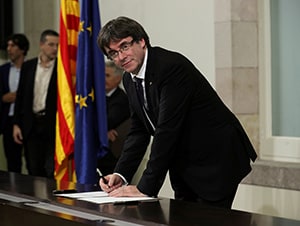The Catalan president gained wider recognition after calling last month’s referendum to secede from Spain, which was deemed illegal by Madrid.
Until recently, few outside of Spain had ever heard of Carles Puigdemont. A latecomer to politics, the Catalan president gained wider recognition after calling last month’s referendum to secede from Spain, which was deemed illegal by Madrid. He then declined to declare independence, while maintaining that the vote was still a mandate for an independent republic of Catalonia.

Raised in a small town, Puigdemont studied philosophy before moving into journalism, rising to be editor in chief of the strongly nationalist newspaper El Punt. Later, he was primarily involved in local politics as mayor of Girona. He wasn’t even a presidential candidate during the Catalan regional elections of 2015, when pro-independence parties won a majority of seats.
A compromise candidate with impeccable nationalist credentials, Puigdemont held together a disparate coalition with the backing of the anti-capitalist Popular Unity Candidacy (CUP). He mobilized grassroots support and delivered a referendum in which 90% of polling booths operated despite a crackdown by Spanish security forces.
A stand-off with Madrid ensued. After Puigdemont refused to withdraw the right to independence, the Spanish government threatened to invoke Article 155 of the Spanish constitution to take control of Catalonia and end its political autonomy. At the time of going to press, Catalonia said it would lodge an appeal with Spain’s Constitutional and Supreme Courts against any attempts to curtail its administrative powers.
Local businesses have responded to the uncertainty by moving legal headquarters (though not, as yet, operations) elsewhere in Spain. The exodus of companies from Catalonia has accelerated—as of press time, it was up to nearly 1,200.
Carsten Hesse, European economist at Berenberg Bank, points out that while Puigdemont and his allies are pleading for EU or other external mediation, “Catalonia has no support from Brussels or any country in Europe. Unilateral independence would mean exiting the eurozone with likely no access to significant credit lines to support whatever came next.”
Hesse expects the messy period to continue for a while before the two sides move slowly toward a compromise that involves greater autonomy for Catalonia. But Puigdemont and his radical supporters could still unleash demonstrations and strikes that become confrontational. “The big wild card,” says Gerard Padro i Miqel, a professor of economics at the London School of Economics, “is what happens inside [Puigdemont’s] head.”



